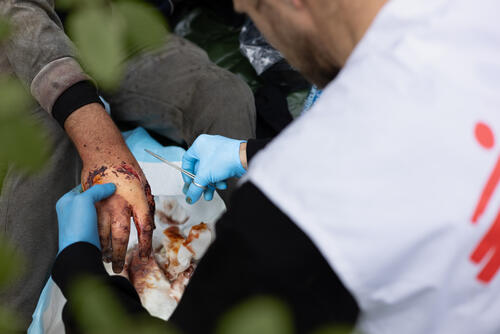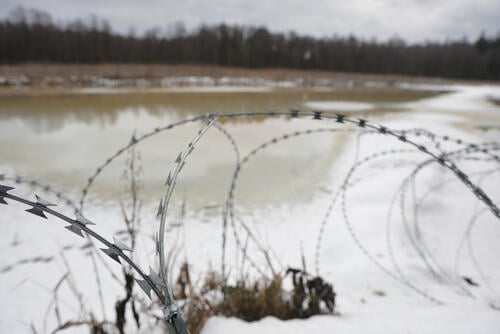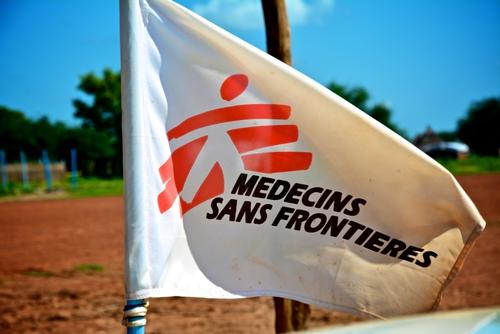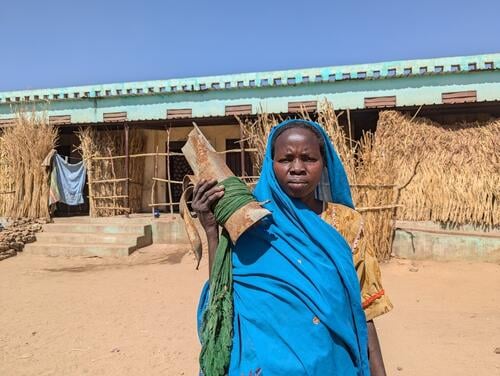- MSF spoke at the Polish parliament on 4 February 2025, outlining what our teams have seen in two years of providing medical care to migrants at the Poland-Belarus border.
- We have witnessed how Poland's legislation has turned into violence against people seeking safety.
- Poland and all EU member states must seek to safeguard the right to asylum.
Since 2021, Poland’s legislative shifts have progressively infringed on people’s rights to seek asylum, culminating in the proposal to entirely suspend this fundamental right for certain groups. Since November 2022, Médecins Sans Frontières (MSF) has witnessed the steady increase of militarisation and violence employed against people seeking safety in Poland. On 4 February, MSF spoke in the Polish parliament, outlining what our medical staff have witnessed in over two years at the border.
MSF calls on Poland and all European Union (EU) member states to urgently change course to safeguard the right to seek territorial asylum, and to stop endangering the lives and wellbeing of people seeking sanctuary in the European Union. For too long, legislation has translated into physical violence against vulnerable people seeking safety.
From November 2022 to November 2024, MSF treated 442 people stranded in the wild forests at the Poland-Belarus border. Some 50 per cent of whom were suffering from physical trauma related to violence. They had sustained injuries from beatings, dog bites and rubber bullets.
Apart from violence, over half of all patients were suffering from frostbite, trench foot or hypothermia due to prolonged exposure to harsh conditions. Other conditions included infections, dehydration, exhaustion, and psychological trauma, as well as deep cuts and fractures related to climbing or falling from the border fence.

Bills passed in 2021 and 2024 have granted additional powers to border guards and soldiers, allowing them near-absolute discretion in denying people asylum without due process. In some cases this has led to family separation. Despite claims that there is humanitarian assistance for migrants and refugees, MSF and other organisations face restrictions from Polish authorities.
Humanitarian workers and civil society volunteers, who play a key role in providing humanitarian assistance at the border, do not have access to the buffer zone and are at increasing risk of criminalisation. As result, a large portion of the area remains inaccessible for humanitarian and medical interventions, including those by MSF.
However, far from improving these policies and practices, the Polish government is proposing even harsher legislation, with the freedom to suspend the right to seek asylum for certain groups.
The Polish government and the Belarusian authorities must acknowledge that these are human beings, not pawns to be exploited for political gain.Uriel Mazzoli, MSF’s head of mission in Poland
“The new and sweeping proposals to suspend asylum rights are unconscionable. The Polish government and the Belarusian authorities must acknowledge that these are human beings, not pawns to be exploited for political gain,” says Uriel Mazzoli, MSF’s head of mission in Poland. “The system as it stands today, forces those seeking sanctuary into a prolonged cycle of violence, without recourse to aid and absolutely nowhere to turn.”
Today, Poland holds the Presidency of the Council of the EU, and the country’s recent asylum legislation has been endorsed in public statements by the EU Commission. Since the so-called ‘migration crisis’ began in Europe in 2015, EU institutions and members states have steadily eroded the foundations of asylum in the EU, instead opting for containment policies in third countries, pushbacks, and outright violence at borders.
Dehumanising rhetoric that characterises migrants and refugees as threats has been key in furthering these policies. The concept of ‘hybrid warfare’ as referred to by Polish and EU officials, in reference to people crossing from Belarus to Poland, is one of the clearer examples of this.
With the Presidency of the EU Council, Poland has the opportunity to demonstrate leadership in putting human life and humane asylum obligations before political currency. Since 2015, MSF teams have borne witness to the colossal failure of EU member states and institutions in addressing the needs of migrants and refugees, consistently opting for violence and containment over humane asylum policies. Poland must ensure that people have access to fair asylum procedures and humanitarian assistance as required.






